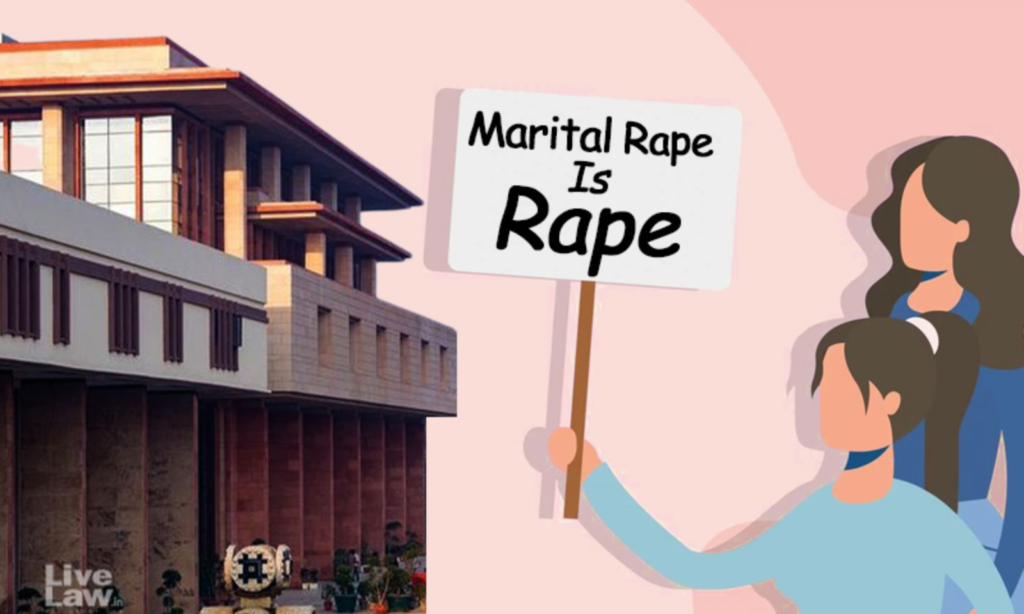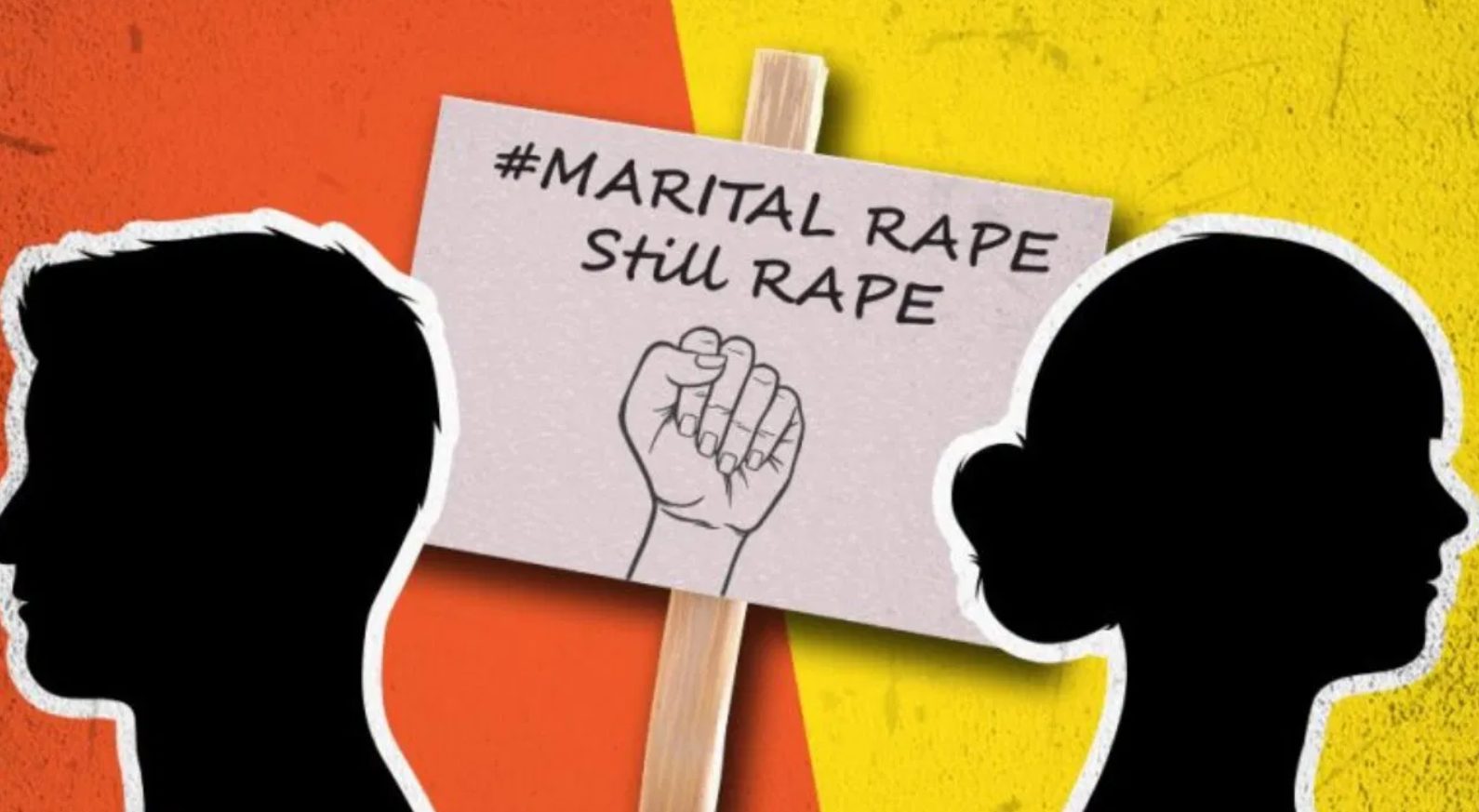
“Marital Rape: Government’s Stance Sparks Controversy in Legal Circles”

The Indian government has firmly opposed the criminalization of marital rape in a recent affidavit submitted to the Supreme Court, arguing that such a move could disrupt the institution of marriage. This statement comes as the Supreme Court reviews petitions challenging the existing legal framework that exempts husbands from prosecution for rape within marriage.
Government’s Position
- Affidavit Submission: The Union Home Ministry filed a counter-affidavit asserting that the Supreme Court does not have the authority to criminalize marital rape. The government contends that existing laws already provide adequate protection for married women, emphasizing that sexual relations between spouses are governed by different expectations compared to those outside of marriage
- Social vs. Legal Issue: The Centre described marital rape as primarily a social issue rather than a legal one, suggesting that any changes to the law should involve extensive consultations with stakeholders and society at large. The government believes that altering the current provisions could lead to significant socio-legal problems
- Expectation of Sexual Access: The affidavit highlighted a “continuing expectation” within marriage for reasonable sexual access between spouses. While it acknowledged that consent is crucial, the government argued that this expectation differentiates marital relationships from other forms of intimacy, thereby justifying the current legal exceptions
- Existing Legal Protections: The Centre pointed out that various laws already protect married women from abuse, including provisions against cruelty (Section 498A IPC) and domestic violence (Protection of Women from Domestic Violence Act, 2005). It stated that these remedies are sufficient and that criminalizing marital rape could undermine the institution of marriage
Judicial Context
The Supreme Court’s review follows a split verdict from the Delhi High Court in 2022, where one judge deemed the marital rape exception unconstitutional while another upheld it. The current case has garnered significant attention, with activists arguing that the exemption violates women’s rights to consent and bodily autonomy
Implications of Criminalization
The government’s affidavit warns that criminalizing marital rape could have far-reaching consequences for marriages in India. It posits that such a legal change might lead to an increase in false accusations against husbands and could destabilize family structures.

What are the main arguments against criminalizing marital rape
The debate surrounding the criminalization of marital rape in India has garnered significant attention, with various arguments presented both for and against the move. Here are the main arguments against criminalizing marital rape:
1. Destabilization of Marriage
Opponents argue that criminalizing marital rape could destabilize the institution of marriage, leading to chaos and anarchy within families. They contend that such a legal change would undermine traditional family structures, which are viewed as foundational to Indian society
2. Marriage as a Sacred Sacrament
In many cultural contexts within India, marriage is seen as a sacred sacrament rather than merely a legal contract. This belief underpins the argument that marriage should not be treated like other relationships where consent can be withdrawn at any time, thus implying that sexual access is an inherent part of the marital bond
3. Potential for Misuse of Law
There are concerns about the potential misuse of laws criminalizing marital rape. Critics draw parallels with Section 498A of the Indian Penal Code, which addresses cruelty against married women and has been criticized for being misused in many cases. They fear that similar misuse could occur with marital rape laws, leading to false accusations and harassment of husbands
4. Moral and Social Awareness
Some argue that simply criminalizing marital rape will not effectively address the issue; instead, there needs to be a broader focus on moral and social awareness regarding consent and sexual rights within marriage. They believe that societal attitudes must change before legal measures can be effective
5. Cultural Diversity and Implementation Challenges
India’s vast cultural diversity presents unique challenges when it comes to implementing uniform laws across different states. Opponents suggest that what may work in one cultural context might not be suitable in another, complicating the enforcement of a national law against marital rape
6. Absence of Law Commission Recommendations
The Indian Law Commission and various parliamentary committees have not recommended the criminalization of marital rape after thorough examinations of the issue. This lack of formal endorsement is often cited as a reason against changing existing laws
7. No Violation of Constitutional Rights
Some argue that non-criminalization does not violate Article 21 of the Indian Constitution, which guarantees the right to life and personal liberty. They assert that women are not legally compelled to remain with abusive partners under personal law, thus maintaining their autonomy
8. Evidentiary Challenges
There are significant evidentiary challenges associated with proving marital rape, including difficulties in establishing consent in situations where sexual relations are expected as part of marriage. This raises concerns about how such cases would be adjudicated in practice
.These arguments reflect a complex interplay between cultural beliefs, legal frameworks, and societal values in India, making the issue of marital rape a contentious topic in ongoing legal and social discourse.

How does the potential misuse of the law impact the argument against criminalizing marital rape
The potential misuse of laws is a significant argument against the criminalization of marital rape in India. Here are the key points illustrating how this concern impacts the broader debate:
1. Fear of False Accusations
Opponents of criminalizing marital rape argue that such laws could be weaponized against husbands, leading to false accusations. This concern is rooted in the belief that disgruntled spouses might exploit the law for personal vendettas, similar to the perceived misuse of Section 498A, which addresses dowry-related harassment. Critics claim that a high percentage of dowry cases are false, with estimates suggesting up to 85% may not be legitimate. This raises alarms about introducing another law that could lead to “legal terrorism,” where innocent individuals face severe legal repercussions based on unsubstantiated claims
2. Judicial Harassment and Social Stigma
There is apprehension that criminalizing marital rape could result in judicial harassment for men, particularly in contentious divorce cases. Instances have been cited where husbands have faced severe social and psychological consequences, including suicide, after being falsely accused under existing laws like 498A. This fear contributes to a narrative that suggests men could be disproportionately affected by a new marital rape law, leading to a breakdown of trust within marriages
3. Burden of Proof Challenges
The complexities surrounding the burden of proof in cases of marital rape further complicate the argument against its criminalization. Critics argue that proving non-consensual sex within marriage is inherently difficult due to societal norms surrounding sexual relations in marriage. If the burden falls on the woman to prove coercion, it may lead to further victimization and stigmatization, while placing an unreasonable expectation on husbands to disprove allegations
. This ambiguity raises concerns about the practical implications of enforcing such a law.
4. Cultural Context and Gender Dynamics
Opponents also highlight that cultural attitudes toward marriage and consent complicate the implementation of a law against marital rape. The prevailing belief in many societies is that marriage implies a continuous consent for sexual relations, which undermines the recognition of marital rape as a distinct crime. This cultural backdrop feeds into fears that criminalization could disrupt family dynamics and social fabric
5. Existing Legal Frameworks
Critics argue that there are already sufficient legal protections for women under laws like the Protection of Women from Domestic Violence Act (PWDVA), which addresses various forms of abuse within domestic settings, including sexual violence. They contend that creating a separate provision for marital rape may be redundant and unnecessary if existing laws are effectively enforced .

Conclusion
The debate over the criminalization of marital rape in India is a complex and multifaceted issue that encapsulates a range of societal, cultural, and legal considerations. Opponents of criminalization raise significant concerns about the potential misuse of such laws, including the risk of false accusations, judicial harassment, and the challenges associated with proving consent in marital relationships. They argue that these factors could undermine the institution of marriage and lead to unintended consequences for both men and women.At the same time, advocates for women’s rights emphasize the importance of recognizing marital rape as a violation of bodily autonomy and personal rights. They argue that the current legal framework fails to adequately protect women from sexual violence within marriage, perpetuating a culture of impunity.As discussions continue, it becomes clear that any legal reform must be approached with sensitivity to cultural contexts and a commitment to ensuring justice for all parties involved. Balancing the need for protection against misuse while safeguarding women’s rights will require thoughtful dialogue, comprehensive legal frameworks, and a shift in societal attitudes toward consent and marriage.Ultimately, this ongoing discourse reflects broader questions about gender equality, personal autonomy, and the role of law in shaping social norms. As India navigates this critical juncture, the outcomes will have lasting implications for both individual rights and the institution of marriage itself.
Discover more from
Subscribe to get the latest posts sent to your email.







